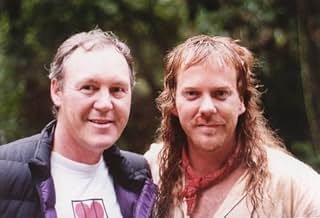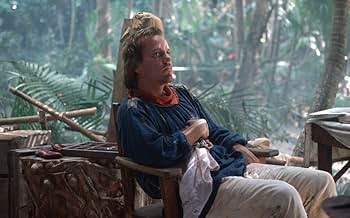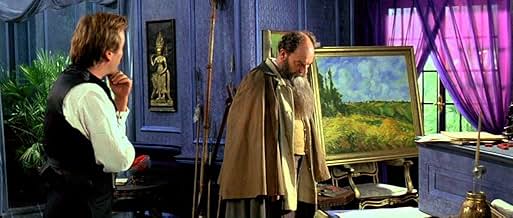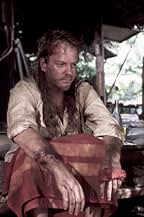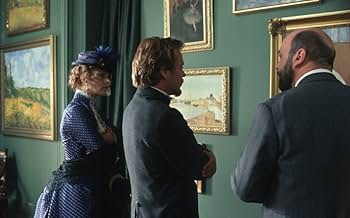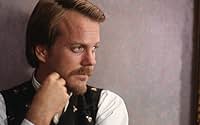A successful 19th century French stockbroker (Sutherland) leaves his profession to become an artist in Paris.A successful 19th century French stockbroker (Sutherland) leaves his profession to become an artist in Paris.A successful 19th century French stockbroker (Sutherland) leaves his profession to become an artist in Paris.
Jana Bittnerová
- Suzanne
- (as Jana Bittnerova)
Featured reviews
My son Ruben Kraaijeveld worked on this movie for 4 weeks while we lived in Prague, acting as one of Gaugain's sons. I see all the other kids named in the crew listing: Jan, Emil and Pauline, but his name is missing. That's a real shame, since he worked hard for it and was only 9 (!) at the time. Movie itself I can't rate, we've been trying for years to get a copy but to no avail. Now I am going to look even harder, there must be a way to see my own kid play!!! He's been in a movie before, an Italian one that only showed in Italy and we also couldn't see. So I'd like to get info on both movies, Paradise Found and "The inverse canon" or "Canone Inverso", which was the Italian title of the movie. Anyone out there that can help maybe??? Thanks!
5=G=
"Paradise Found" attempts to tell the story of Paul Gauguin (Sutherland) and flops. The film neither works as a biopic or a drama treating the subject only superficially, leaving gaping holes where important events belong, showing generally lackluster direction, and apparently fraught with low budgetness. Those interested in the life of Gauguin can learn more in a few minutes on the internet and those interested in a drama can easily dredge up something better on broadcast. Nonetheless, "Paradise Found" may have some value for Sutherland or Kinski fans or others who happen to surf it on broadcast as did I. (C)
But let's face it, only two very select demographic groups were likely to be interested in the first place firstly, Gauguin enthusiasts and, secondly, insomniacs like me who'll still be awake to catch this kind of obscure, unknown of picture when satellite/cable TV airs it in the early hours.
I don't know much about the real life Paul Gauguin, so I can't really judge for myself how historically accurate this thing is, but it wouldn't surprise me if it's taken a few liberties along the way I mean, what historical movie hasn't? (You ought to skim through a couple of films about the English Civil War to see what they've done to the real-life Oliver Cromwell). But regardless, at heart 'Paradise Found' is a weak film striving to be stronger all the while, and in some ways that is something to be admired. It definitely does have things on its mind, and a message all there and waiting to be revealed - it's just not sure exactly how it wants to say it, and that's the movie's major stumbling block defined. Some pretty interesting issues and talking points are skimmed upon but go understated - generally, this is about religious and cultural tolerance and the importance of staying true to your personal dreams, but the screenplay doesn't have enough confidence to speak out loud enough on either topic. Added to which, so little weight is given to Gauguin's own personal philosophical musings on these issues throughout that when they finally come they feel like more of a tacked on afterthought, and never allow for any truly pensive impact. There are also too many flat supporting characters who could've done with a bit more polish and substance in order to give it more contextual support.
Nonetheless, there were enough aspects of 'Paradise Found' I liked to make it well-worth the viewing namely, Kiefer Sutherland. His performance as Gauguin is really something a strong lead can do wonders for even the most sheepish of movies and I'm glad to see that people here have at least been giving him credit for it. We follow Gauguin as he quits his job in Paris as a stockbroker and tries to make it as an artist, soon learning that there are no easy roads to instant success. So he decides to got to Tahiti for his inspiration actually, due to the non-linear structure of the film, we know this by the very opening scene. Two stories, one of the past (Gauguin's life in Paris), one of the present (his life in Tahiti), are neatly interwoven and told almost simultaneously. Personally I'm not going to criticize 'Paradise Found' in this respect as far as I'm concerned it was one of the screenplay's biggest merits. For all it was worth, it managed to 'shake up' the story somewhat and latch onto my curiosity, and as soon as I'd sussed out the formation of the film I was genuinely curious to know more if anything, just how this wealthy family man could have ended up in such a position, as well as where he'd go from there. This is open to dispute, but I seriously doubt that this same narrative would've worked any better in the conventional format.
Nobody is going to argue with the aesthetic qualities of this film visually speaking, it's a real blessing, capturing the natural splendor of those colourful tropics to the core. And it isn't entirely lacking in human emotion. Gauguin's ever-increasing conflict with his worldly wife doesn't quite manage to stir up any deep feelings within, which is a shame because it's treated as pretty much the central focus, though his relationship with his youngest daughter is a lot more involving, and provides the movie with a few genuinely emotive moments that could surprise you.
All in all, 'Paradise Found' is too slow-moving and unsure of itself to be everyone's cup of tea, but it's still a perfectly light and refreshing enough experience for anyone willing to look past those problems. And while it may not go down as an instant classic amongst fans of Kiefer Sutherland, following the cool but cold mechanics of his usual action thriller routines like '24' and 'Phone Booth', I appreciate his gumption for trying something different. After all, it's ideal as a movie for the early hours - worth watching if you're still awake for it, but perhaps not quite so getting up for.
Grade: C+
I don't know much about the real life Paul Gauguin, so I can't really judge for myself how historically accurate this thing is, but it wouldn't surprise me if it's taken a few liberties along the way I mean, what historical movie hasn't? (You ought to skim through a couple of films about the English Civil War to see what they've done to the real-life Oliver Cromwell). But regardless, at heart 'Paradise Found' is a weak film striving to be stronger all the while, and in some ways that is something to be admired. It definitely does have things on its mind, and a message all there and waiting to be revealed - it's just not sure exactly how it wants to say it, and that's the movie's major stumbling block defined. Some pretty interesting issues and talking points are skimmed upon but go understated - generally, this is about religious and cultural tolerance and the importance of staying true to your personal dreams, but the screenplay doesn't have enough confidence to speak out loud enough on either topic. Added to which, so little weight is given to Gauguin's own personal philosophical musings on these issues throughout that when they finally come they feel like more of a tacked on afterthought, and never allow for any truly pensive impact. There are also too many flat supporting characters who could've done with a bit more polish and substance in order to give it more contextual support.
Nonetheless, there were enough aspects of 'Paradise Found' I liked to make it well-worth the viewing namely, Kiefer Sutherland. His performance as Gauguin is really something a strong lead can do wonders for even the most sheepish of movies and I'm glad to see that people here have at least been giving him credit for it. We follow Gauguin as he quits his job in Paris as a stockbroker and tries to make it as an artist, soon learning that there are no easy roads to instant success. So he decides to got to Tahiti for his inspiration actually, due to the non-linear structure of the film, we know this by the very opening scene. Two stories, one of the past (Gauguin's life in Paris), one of the present (his life in Tahiti), are neatly interwoven and told almost simultaneously. Personally I'm not going to criticize 'Paradise Found' in this respect as far as I'm concerned it was one of the screenplay's biggest merits. For all it was worth, it managed to 'shake up' the story somewhat and latch onto my curiosity, and as soon as I'd sussed out the formation of the film I was genuinely curious to know more if anything, just how this wealthy family man could have ended up in such a position, as well as where he'd go from there. This is open to dispute, but I seriously doubt that this same narrative would've worked any better in the conventional format.
Nobody is going to argue with the aesthetic qualities of this film visually speaking, it's a real blessing, capturing the natural splendor of those colourful tropics to the core. And it isn't entirely lacking in human emotion. Gauguin's ever-increasing conflict with his worldly wife doesn't quite manage to stir up any deep feelings within, which is a shame because it's treated as pretty much the central focus, though his relationship with his youngest daughter is a lot more involving, and provides the movie with a few genuinely emotive moments that could surprise you.
All in all, 'Paradise Found' is too slow-moving and unsure of itself to be everyone's cup of tea, but it's still a perfectly light and refreshing enough experience for anyone willing to look past those problems. And while it may not go down as an instant classic amongst fans of Kiefer Sutherland, following the cool but cold mechanics of his usual action thriller routines like '24' and 'Phone Booth', I appreciate his gumption for trying something different. After all, it's ideal as a movie for the early hours - worth watching if you're still awake for it, but perhaps not quite so getting up for.
Grade: C+
Being the die hard Sutherland fan that I am, I enjoyed this flick purely for his performance. The film is rather superficial and slow-moving, but there is quite a bit of power behind Sutherland's performance, which makes it worth the while of those who just need more of Kiefer. I can't say I'd watch this film again, but I appreciate the emotional investment that the actors put into it. A six out of ten.
Can anyone tell me of another film on Gauguin's life? While not as passionate as Lust for Life (van Gogh), I enjoyed seeing Paradise Found, and I saved it & have watched it several times now. I wanted it to go on longer.
In my 30s I painted several oils, & seeing this has inspired me to get out my brushes again. I wish more artists lives were available. William Blake, Turner, and others. PF was made by Australians, & I bet Hollywood would have changed the story line even more.
In my 30s I painted several oils, & seeing this has inspired me to get out my brushes again. I wish more artists lives were available. William Blake, Turner, and others. PF was made by Australians, & I bet Hollywood would have changed the story line even more.
Did you know
- TriviaKiefer Sutherland's father, Donald Sutherland, also portrayed the artist Paul Gauguin in the film Gauguin, le loup dans le soleil (1986).
- GoofsPissarro is misspelled "Pissaro" in the closing credits (but spelled correctly in the DVD captions).
- Quotes
Paul Gauguin: I have some advice of my own: you'd best mind your own fucking business.
- ConnectionsVersion of Gauguin Le Sauvage (1980)
- How long is Paradise Found?Powered by Alexa
Details
Box office
- Budget
- A$10,000,000 (estimated)
- Runtime1 hour 33 minutes
- Color
- Sound mix
- Aspect ratio
- 2.35 : 1
Contribute to this page
Suggest an edit or add missing content



